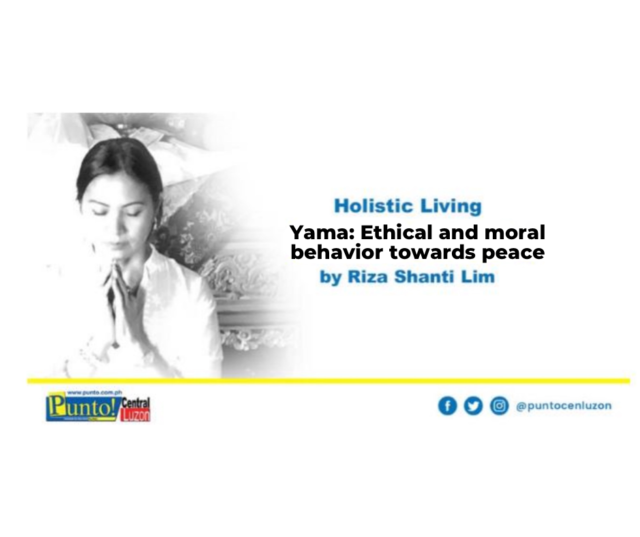I RECEIVE calls and messages from readers, asking for more details about the eight-fold path or limbs of yoga, that was mentioned in my previous article, Yoga:The Royal union of the self, which, I am convinced,stimulated their interest to practice yoga, for they learned its invaluable benefits. Here it is:
All religious and spiritual traditions encourageeveryone to live ethical and moral lives.
To lift the veils to reveal the hidden layers from the core of your being, ashtanga, the eight limbs or eight-fold path of yoga, was emphasized in the book Yoga Sutras by the great sage and father of yoga, Maharishi Patanjali.
The eight limbs comprise: yama, niyama, asanas, pranayama, pratyahara, dharana, dhyana, and samadhi.
The eight limbs were created for the intention todiscover yourself as an unbounded spirit, disguised as body/mind, to liberate you from all kinds of complexities in life and live with pure love, compassion, and confidence.
Just as a servant seeks a master to serve, a disciple seeks the best guru, and a man seeks for the best wife, so too will the mind naturally seek its Universal Self or Truth.
Yama is the first limb of yoga which means moralbehavior. It teaches us, how we should conduct ourselves in an ethical manner towards all creations.Yama consists five restraints/parts:
Ahimsa or non-violence, harmlessness. Not to cause injury to anyone, even to animals and nature, in thoughts, words, and action. Mahatma Gandhi won the hearts of the many in the world, when he applied the principle of non-violence, for the independence movement of India from Britain. Vegetarianism is a form of ahimsa.
Satya or truthfulness (in deeds, words, and intention) ornon-lying. Recognizing that truth is different for every people, you accept it without losing the grip of your own truth. According to SRI K Patthabis Jois, the father and founder of the globally popular, Ashtanga Yoga, if one always follows the truth, all one’s word will automatically become true and desires will be fulfilled.
Asteya or honesty, non-stealing. Cheating, destroying others’ reputation and properties for selfish gain is part of asteya. Dishonesty derives from fear of loss either ofmoney, love, position, power. The ability to live an honest life, is dependent on your deep connection withyour spirit. When inner attainment predominates, the need to manipulate, obscure and deceive, loses its grasp on you. And as asteya is embraced in your daily life, prosperity follows.
Brahmacharya or preservation of vital energy, sexualself-control. The word “brahma” means “highest consciousness” also refers to the “creator” in Hinduism, while “acharya” means “spiritual teacher/path.” In Vedic society, people chose one of the two paths for brahmacharya. For the monks and nuns, they choose celibacy, renouncing any form of sexual activity to preserve their vitality for worship. For husbands and wives, an observance of healthy and moderation in copulation is exercised, considering the act as something sacred, a celebration of the union of two divine forces.
Aparigraha or non-possesiveness, non-greediness. Its practice generates expanded awareness, cultivates generosity, because our true nature is generous. Attachment to any material things, addiction to accumulation, even attachment to your own body, or to people, loses its hold on you in this practice. It doesn’t mean that you should not enjoy life’s pleasures, it simply means you are not imprisoned by it.
Mindfully acting from the level of your soul and the seed of your being embedded in the abyss bed of peace, penetrating every pore of your entireness, you are incapable of violence, untruthfulness, dishonesty, careless wastage of your sacred energy and attachment. Therefore, the essence of yama is fulfilled.
OM Shanti.





